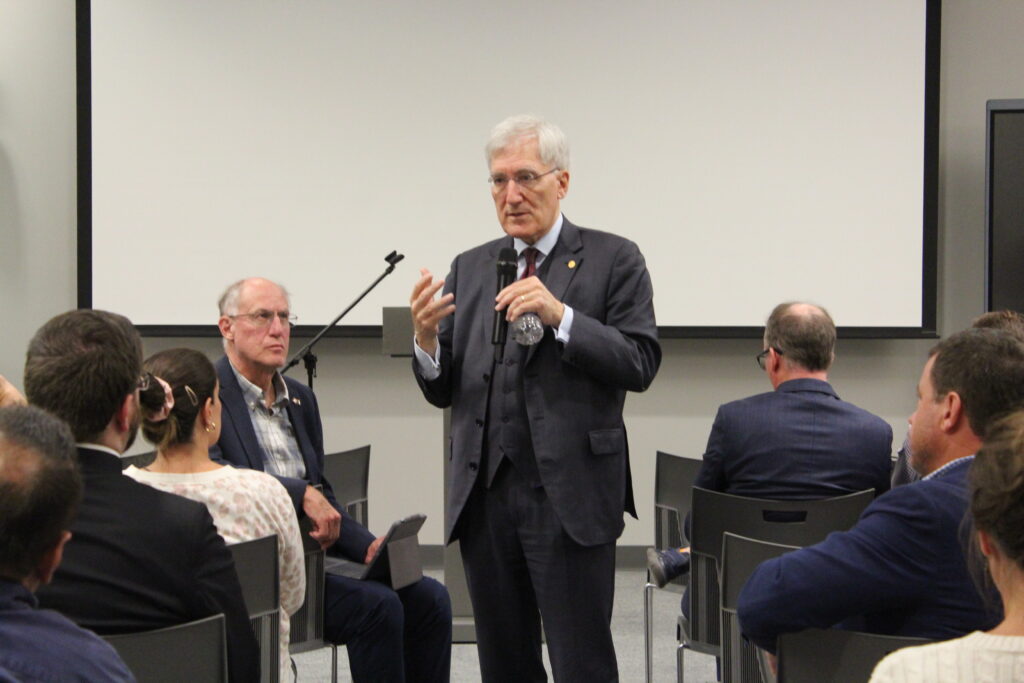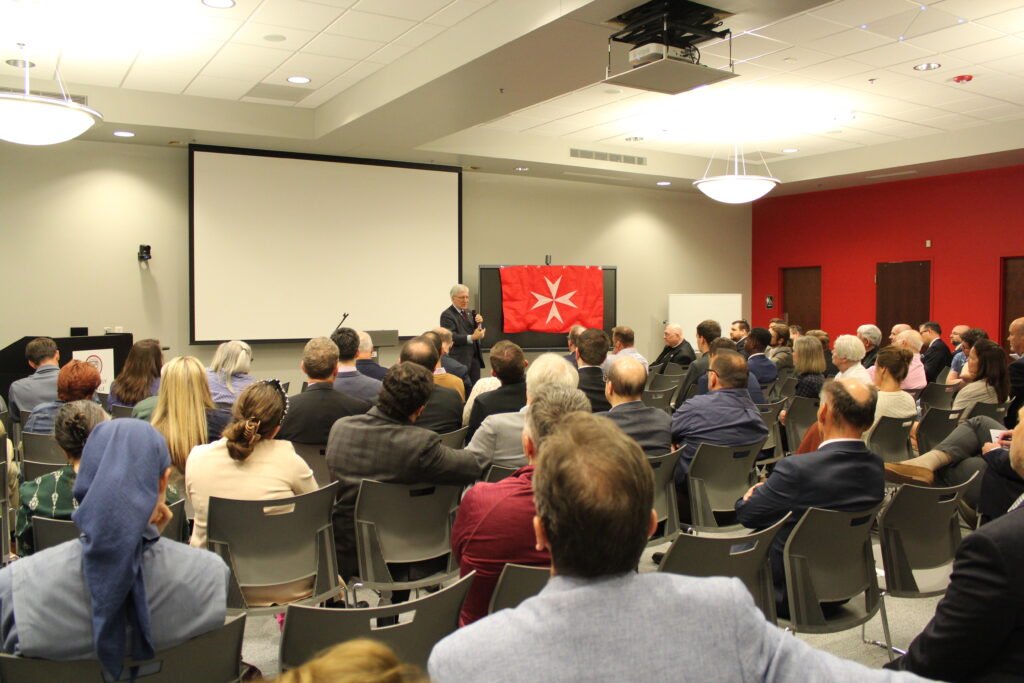
by Marc and Julie Anderson
mjanderson@theleaven.org
KANSAS CITY, Kan. — To call Professor Robert P. George an intellectual might be an understatement.
The McCormick Professor of Jurisprudence and director of the James Madison Program in American Ideals and Institutions at Princeton University in New Jersey, George holds advanced degrees from Harvard University in Cambridge, Massachusetts; four degrees from the University of Oxford in England; and 23 honorary degrees in subjects such as law, science and divinity. Among his books are “Making Men Moral: Civil Liberties and Public Morality”; “Embryo: A Defense of Human Life”; and “In Defense of Natural Law.”
And those are just some of his credentials.
On Sept. 26, George spoke on “Christianity and the Challenge of Paganism: Then and Now,” to close to 100 people at Donnelly College’s Event Center in Kansas City, Kansas. Sponsored by the Kansas City region Order of Malta and cosponsored by Donnelly College, the speech served as the Order of Malta’s annual Defense of Faith lecture.

Founded in 1113, the order is a lay religious order active in 120 countries with a mission of “caring for people in need through its medical, social and humanitarian works.”
The lecture’s first part focused on the existence of inherent human dignity.
“If that stunningly unpagan and antipagan moral proposition is true, then the respect called for by that dignity, even in the weak, even in the vulnerable, even in the poor, even in the disabled, even in the lowly, even in the despised, demands something that is as alien to paganism as it could possibly be — namely, a genuine reverence for human beings, for human life,” George said.
Elsewhere, he noted that once people understand the concept of inherent human dignity, other questions follow.
“How shall we conceive and pursue our common good as members of communities?” he asked. “How can we pursue the common good in ways that are consistent with the inherent and equal dignity of the human person?”
Noting how many 20th-century scholars argued for and believed in a neutral form of government — that is, government without any religion or morality — the professor said that many critics, himself included, say that is “neither desirable nor possible.”
“In 2024,” he said, “little effort is made by secular liberal philosophers to maintain the pretense of neutrality. Having gained the advantage, and in many cases, having prevailed — at least for now — on the battlefront, in battle after battle in the modern cultural war and having achieved hegemony in the lead sectors of the culture . . . there is no longer any need to pretend that the view being advanced is neutral.”
Take, for example, he said, the issue of marriage.
“No one on either side doubts that marriage, as redefined by the Supreme Court a few years ago in the Obergefell case, embodies substantive ideas about morality and the human good — ideas that differ profoundly from those embodied in previous marriage law, ideas that are, according to partisans of the new definition of marriage, to be preferred to competing ideas such as the biblical and natural law understanding of marriage precisely because they are superior to the ideas that they supplanted.”

Elsewhere, George said he agrees with Steven Smith, a professor at the University of San Diego who argues in “Pagans and Christians in the City: Culture Wars from the Tiber to the Potomac” that views being advanced today are really “a revived, revitalized modern form of paganism.”
Later, the professor explained why Christianity was viewed as a threat by Roman authorities.
“It (Christianity) took an interest in the world, and it developed ideas about such things as authority, obligation, law, justice and the common good — ideas that challenged pagan ideas and practices and challenged them in a variety of areas including some profoundly important areas. . . . Christian ideas about sex and, in consequence, Christians’ condemnation of Roman sexual practices, figured very significantly in that perception,” he said.
The same is true with regard to the gay rights movement now, as claims of religious discrimination are viewed as excuses for discrimination. Still, he said he sees no other options but to bear faithful witness to Christian ideals, no matter the cost.
“Are we willing, if necessary, to pay the cost of discipleship?” asked George in conclusion. “Because without God’s help, nothing of this kind would be possible. We are too frail, too weak, too scared.
“Yet, we have it on good authority, the very best authority, that God’s grace is super abundant. No one who asks for the courage to bear faithful witness will be denied it. So, shall we flee the battle? No! Quite the opposite! Onward, Christian soldiers.”






